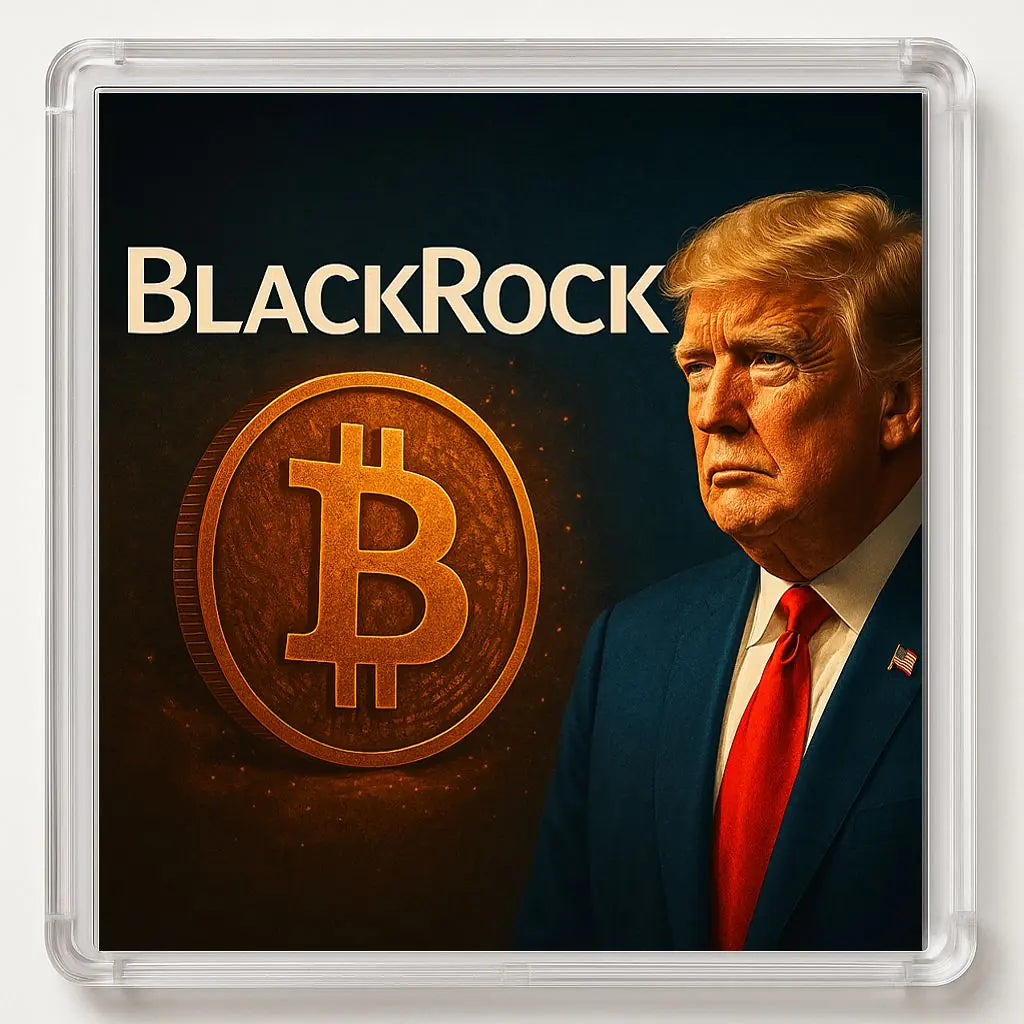
BLACKROCK, TRUMP, AND BITCOIN: THE END OF THE CYPHERPUNK UTOPIA?
Share
THE CYPHERPUNK DREAM FACES MAINSTREAM ADOPTION
When Satoshi Nakamoto published the Bitcoin white paper in 2008, he was primarily addressing cypherpunks, pioneers of digital freedom who dreamed of a world without surveillance and censorship. Bitcoin was then a peaceful weapon intended to bypass banks, protect privacy, and restore control to individuals. Fifteen years later, the cypherpunk utopia is colliding with an unexpected reality: Bitcoin's mass adoption is now happening through the world's largest financial institutions, like BlackRock, and is finding itself at the heart of political strategies, particularly with the return of figures like Donald Trump. Do these events mark the end of a dream or the paradoxical fulfillment of a prophecy? The arrival of Bitcoin spot ETFs, validated by the SEC and piloted by giants like BlackRock, has changed the game. From a fringe asset reserved for geeks and financial anarchists, Bitcoin is becoming a financial product like any other, bought and sold through the brokerage accounts of major banks. This movement is attracting thousands of institutional investors, bringing colossal liquidity, and pushing the price of Bitcoin to new highs. But it raises a crucial question: can we still talk about a monetary revolution when Bitcoin is becoming a diversification tool for billionaires? The risk is that the protocol will be exploited by those it was meant to combat. Large funds can manipulate markets, cause panics, or organize massive consolidations, while taking advantage of the blockchain's transparency to anticipate the movements of small investors.
TRUMP'S RETURN AND BITCOIN'S POLITICAL RECOVERY
Tensions mount when politics enter the picture. Recently, Donald Trump has made numerous statements in favor of Bitcoin, going so far as to present himself as the “pro-Bitcoin president” in the face of Joe Biden, who is considered hostile to cryptocurrencies. These stances come at a time when candidates are courting a new generation of voters sympathetic to decentralization, financial sovereignty, and libertarian ideas. But they raise a paradox: Bitcoin, conceived as an apolitical tool, is becoming a campaign tool, an argument to rally those disaffected by the system. Cypherpunks, fiercely opposed to any institutional co-optation, find themselves faced with a heartbreaking question: should we rejoice in Bitcoin's gaining legitimacy or worry about it being used as political leverage? Using Bitcoin as an electoral standard risks accelerating regulation in a way that runs counter to its original intent. The United States could adopt ambiguous laws: favorable to Bitcoin ownership, but hostile to anonymity or wallet autonomy. The risk is to transform Bitcoin into a mere extension of the existing financial system, where only regulated actors benefit from legal protection, leaving autonomous users exposed to criminalization or stigmatization. In this scenario, the line between adoption and reclamation becomes blurred, and the cypherpunk spirit erodes as Bitcoin is integrated into the electoral strategies and influence games of major powers.
BLACKROCK, AN ALLY OR A TROJAN HORSE?
BlackRock's involvement in the Bitcoin market has been hailed as a historic milestone by some, and a betrayal by others. With over $10 trillion under management, BlackRock is not just a financial player: it is a force capable of influencing political decisions, international regulations, and the economic choices of the largest companies. When BlackRock declares its confidence in Bitcoin, the protocol acquires unprecedented credibility. But at what cost? This institutional legitimacy comes with a dilution of fundamental values. The institutionalization of Bitcoin could encourage the emergence of “clean” versions, compliant with KYC/AML requirements, marginalizing private and pseudonymous uses. Massive adoption by Wall Street could also accelerate the development of complex derivative products, disconnected from the “be your own bank” philosophy. BlackRock also has the ability to influence the narrative around Bitcoin. Through its media power and network of partners, it can shape public perception, promoting a sanitized vision of cryptocurrency, focused on financial returns rather than individual sovereignty. Far from Satoshi's initial vision, Bitcoin risks becoming just another speculative asset, stripped of its subversive dimension. This risk is compounded by growing efforts to link transactions to verified identities, in an effort to satisfy the demands of regulators and institutional partners.
THE CROSSROADS: CAN BITCOIN RETAIN ITS SOUL?
Institutional adoption and political instrumentalization do not necessarily mean the end of the cypherpunk dream. Rather, they represent a new battle: that of preserving the original principles in the face of massive pressure for conformity and centralization. Open source remains a powerful bulwark: the Bitcoin protocol itself is extremely resilient, and no institution, not even BlackRock, can change the network rules without the agreement of the majority of nodes. The cypherpunk community has always been adept at reinventing itself to preserve user sovereignty, and new technologies are emerging, such as the Lightning Network and advanced privacy solutions, to defend individual autonomy. But the greatest threat comes not from institutions, but from user complacency. Bitcoin will never be freer than those who hold it. If the majority prefers the ease of ETFs and regulated custodians, the cypherpunk spirit will naturally die. Conversely, if an active minority continues to favor personal wallets, self-sovereignty, and peer-to-peer circulation, Bitcoin will remain true to its original promise. It's up to each individual to choose what future they want for Bitcoin: a future of freedom, or a future of institutional dependence. And this choice will determine whether the cypherpunk utopia is truly dead, or whether it's being reborn in an unexpected form.
👉 Also read:
